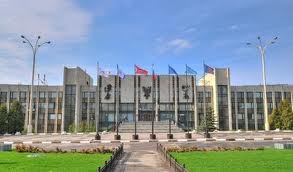New Dual Degree Matches Moscow and Monterey

Students choose the Middlebury Institute of International Studies at Monterey because they want to have an immediate impact. Those admitted to a new dual degree program at the Institute will have the opportunity to do exactly that, after earning both a Master’s in Nonproliferation and Terrorism Studies from the Middlebury Institute and a Master’s in International Affairs from the Moscow State Institute of International Relations. The latter school, commonly known by its Russian acronym MGIMO, is one of Russia’s most prestigious and internationally respected educational institutions.
The new dual degree program’s unique focus on weapons of mass destruction (WMD) nonproliferation and U.S.-Russian relations will appeal to “a niche audience,” says Nonproliferation and Terrorism Studies Program Chair Jeff Knopf, “but if people fit the niche, it’s going to be really exciting for them.”
Students in the program will spend their first semester in Moscow attending classes at MGIMO, followed by two semesters in Monterey, with all subject-matter classes in both locations taught in English. Most students will also study a second language, and both MGIMO and MIIS offer Russian language classes for non-native speakers of that language. The final semester will be devoted to a professional internship placement—one of the special features of the program that Knopf believes will be very attractive to students.
The program’s interdisciplinary curriculum covers global security, history, science and technology, area studies, public policy, and research methods, with an emphasis on practical skills. Graduates will be well-prepared for professional careers in the nonproliferation field in national governments, international organizations, academia, think tanks, and the private sector, and will have access to both schools’ influential alumni and professional networks.
The dual degree program also embodies the Institute’s commitment to immersive learning. “For an American student, right off the bat you’re going to spend the first semester in Moscow at MGIMO learning how the Russian education system works and getting instruction from people who have connections to the Russian policy process,” explains Knopf. International students will have a similar experience in reverse while studying in Monterey.
Another unique aspect of the dual degree program is that the educational programs at both institutions will be actively supported by research centers affiliated with the two schools. The Institute’s James Martin Center for Nonproliferation Studies (CNS) will be closely involved in Monterey, as will the PIR Center in Moscow. Both centers will also help to identify and create internship opportunities for students, with possible placements in international organizations such as the International Atomic Energy Agency and the United Nations Office for Disarmament Affairs. “Students in the program will get to rub elbows with very senior people right from the beginning and start building up their networks of professional contacts.”
“We’re looking for students who are high flyers,” concludes Knopf, “very focused and ambitious in what they want to do.” In other words, students eager to vault into positions that will, by definition, have an impact in one of the most important policy arenas, and bilateral relationships, of the modern era.
For More Information
Jason Warburg
jwarburg@middlebury.edu
831.647.3156
Eva Gudbergsdottir
eva@middlebury.edu
831.647.6606
